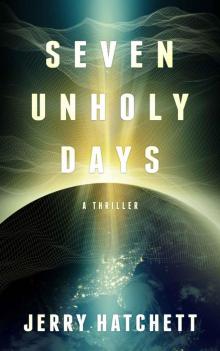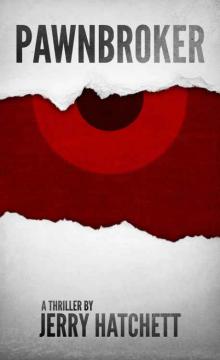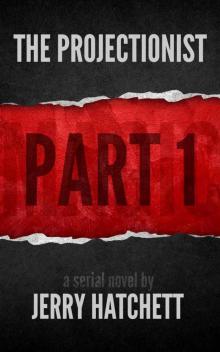- Home
- Jerry Hatchett
The Projectionist
The Projectionist Read online
1
The Diebold Review would tomorrow announce that the Alice Hamlin Memorial was the largest crowd to ever gather at The Magic, which automatically made it the largest gathering ever in Diebold, Tennessee. They milled about the auditorium, where Alice's favorite movie, The Shop Around the Corner, softly played. The balcony creaked beneath a full load. The lobby, the corridor between lobby and auditorium, the concession area. Every space inside the old building, even the sidewalk outside, bulged with townspeople who came to say goodbye to their friend.
Underneath the marquee, its neon beckoning brightly even in the sunlight, its billboard proclaiming GOODBYE ALICE, sat the ticket booth where Alice Hamlin had sold movie tickets for forty-two years. On the counter just behind the glass was a framed photograph, replete with her trademark smile, the bottom of the frame wrapped with a bow of white lace. Inside, where the back of the ticket booth was open to the lobby, stood Porter, Teddy, and the mayor of Diebold, Hank Goddard, also the proprietor of Hank's Superette. Porter thought Goddard always looked to be on the cusp of a heart attack, his fleshy face perpetually red, tiny veins crawling his nose.
"I remember," Goddard said, "trying to sneak in here right after the place opened. I must've been eleven or twelve. I got up in the middle of the line of folks coming in, all scrunched down, thinking how slick I was. Next thing I know, Alice has me by my ear!" All three men laughed. Goddard rubbed his ear. "Man oh man, sure will miss her, Porter."
Teddy pointed underneath the counter in the ticket booth. "There's her foot heater, she called it. Middle of summer, air conditioner running flat out, and there'd be Alice with her electric heater. How long's that thing been down there, Port?"
"I'd say thirty years or more."
"About right."
"Forty-two years, never missed a day of work here," Porter said.
"You got to be kidding me, that's amazing," Goddard said.
"Yep," Teddy said, hooking a thumb toward Porter, "but neither has this old fart. All three of us were here the night The Magic opened. She sold the tickets, Porter ran the movies, I sold concessions. Been here ever since, though I sure can't make the same claim on perfect attendance."
"Now that's what I'd call a low turnover. Well, fellows, I better get going. Porter, again, I can't tell you how sorry I am. If you need anything at all, you let me know. I mean that."
"Appreciate it, Hank."
Goddard clapped him on the shoulder, gave him a taut little hang-in-there shake of the fist, and was gone. Somebody showed up and pulled Teddy away, and Porter was alone. His first instinct was to grab Teddy, pull him back, beg him not to leave. But he didn't. He looked around at all the people, mingling, talking. Many of them had been to the funeral, then the graveside service, and still wore their black clothes.
Despite the stated purpose of this event, despite the affection for Alice that virtually every person here would profess, most of these people looked happy. They talked. They munched on free popcorn from the concession stand, washed it down with free Coke. They smiled. Until they saw him. The moment that happened, they flicked on their Mournfully Devastated Switch.
There was something fundamentally dishonest about that, Porter thought. You were either happy or sad. And rarely did you go from one to the other in the blink of an eye. Why the act? Why couldn't people be honest: Hey Porter, came by here because people would've talked about me if I didn't. Alice? Yeah, I liked her okay, but truth is, I saw the woman for a minute or so, a few times a year. I feel bad for you, old man, but I better be pushing on. There's a great game on tonight and I hate to miss a kickoff. If I see you again, I'll remind you how sorry I am, though. Later.
That was reality. Wasn't it? If not, why all the happy faces right now while he stood by the ticket booth alone? Alone. That's what he would be from now on. How could he survive? Porter wasn't a man much concerned about machismo. No, Alice had been the strong one. No doubt about that. She was also the one everyone loved. Not him. Alice was the vibrant, public face of their union. Porter was the quiet background. Now her strength, her everything, was gone. He flinched when someone tapped him on the hand.
"Mr. Hamlin, sir?" It was that kid Alice had been so hung up on, Rasheed. Willie and Flora Thompson's boy. She was always paying for him to see movies, buying him popcorn.
Alice. What an old softy she was. You'll be an old softy yourself before I'm through with you, Porter Hamlin. He spun around, looked into the booth where Alice's voice had come from, his heart pounding in wild excitement. The booth was empty. Exhilaration faded back to despair. The voice had been so real, too real to be in his head. Or maybe Porter Hamlin was just losing his grip. Maybe Alzheimer's was reaching out for him, preparing to rein him in with one of its macabre tentacles.
Another tap. "Mr. Hamlin?"
"Hello, young man. Thank you for coming--" Porter finally looked down, saw the kid's face. He wasn't there to offer comfort. He was there looking for some. Swollen tears trailed down his brown face. No switch involved. Porter dropped to a knee, took the boy in his arms, held him while he sobbed. "I miss her, too, Rasheed. I miss her, too."
2
The passage of time had done nothing to ease the pain. Porter got out of an empty bed each morning, went to an empty kitchen, made coffee that he drank alone. He worked both shifts at The Magic every day, one of them free of charge, to escape the house whose boards seemed to creak and moan in misery themselves. Other than Teddy, the visitors had stopped coming. They still gave the little consoling smiles when he met them on the street or at work, still administered the occasional squeeze of the shoulder. Worthless.
As bad as the days were, nights were worse. Exhausted, yet unable to sleep more than a few minutes at a time, he spent most of the time staring into the darkness, cursing the God who took his life and wrung the joy from it like water from a rag.
On this day, he decided to go through the stack of mail that had piled up on the old table beside the front door. Not that he cared what was in the stack, but because Alice was nagging him about letting it pile up. Porter was imagining the nagging--he was pretty sure of that--but he had discovered that what's said in the mind and soul often trumps brick-and-mortar reality by a long shot.
And every time he had come in or gone out the front door for the past several days, passing the table in the process, he had heard Alice's voice: Porter Hamlin, might be something important in that mail! He ignored it the first few times, but recently he had taken to answering her. Briefly at first, then full-blown discussions on the pros and cons of mail examination. Alice's logic finally won out--nothing unusual there--and he took the stack to the dining room table.
* * *
Porter stared at the document in his hands, read it a third time, found it just as hard to believe. Your presence is hereby requested on September 12, at the law offices of H. Lawrence Walker, for the reading of the last will and testament of Alice Hamblin, of Diebold, Tennessee, said will having been executed on July 7. They had done their wills together. Updated them once a year. Together. And Larry Walker wasn't their lawyer.
He put the letter down and made his way to the bedroom closet, where he moved aside a stack of old clothes and pulled out the metal firebox that held a lifetime of important papers. Inside, their three wills--his, hers, joint--rode the top of the stack as they had for years. He opened Alice’s will, looked at the date: May 12. Then back to the letter from Walker: July 7. Two weeks before she died. Porter re-folded the will and put it back in the box. Three days to wait. Three long days to wonder why his dear bride would have kept something so important from him.
* * *
"Porter, Porter, do come in!" Larry Walker said, beaming a bleached smile that stretched across his tan, leathery face as he usher
ed Porter into his office. "So sorry for your loss, Porter. How're you holding up?"
Porter had been endlessly consoled for seven weeks. Every person he met was sorry. Every person he saw couldn't believe poor Alice was gone. Hell, they may as well believe it. He had the empty house, the lonely nights to prove it. He could show them the big, empty, sunken spot in the mattress where Alice had lain. She was gone, and Porter wasn't in the mood for Larry Walker's fake concern.
"Fine, Larry. Let's get to it."
"Of course, of course."
"Why do you say everything twice?" Porter felt like a jerk the moment the words rolled off his lips. It wasn't Larry Walker's fault that Alice was gone. Yeah, he was a pompous little small-town lawyer who loved to put on a big-city shine, but that was no excuse.
Walker's smile was gone, replaced by something Porter thought looked a lot like hurt. "I'm sorry, Larry, that was uncalled for."
"No problem, Porter. No...have a seat."
Porter eased into a tufted leather chair while Walker made his way around his desk and sat. A file labeled Alice Hamblin lay on the desk. A very thick file. Walker picked it up, removed a sealed envelope, and handed it across the desk to Porter.
"She wanted you to read this first."
3
Porter reached across the desk and took the envelope from Larry Walker's leathery hand. Walker offered a letter opener. Porter declined, slipped a fingernail under the edge of the flap, broke the seal, and opened it. Inside was a single, folded sheet of stationery paper, filled with Alice's handwriting.
July 7
My Dear Porter:
I hope this finds you well and in good spirits, my love, but I figure that's too much to hope for right now. Although I told you many times during the last months, it's important to tell you again, right now, that you were, are, and will always be the love of my life. No matter what happens, please don't ever doubt that. It is the truth, Porter. On this I swear.
You are no doubt confused and wondering why I created a will that you knew nothing about. On this, I can only ask you to trust me. All will be revealed in time. For now, please tell Mr. Walker that you are ready to proceed with the reading.
Forever yours,
Alice
Porter slowly laid the letter onto the desk, more confused than ever. What could happen to make him doubt Alice's love for him? It was unthinkable, yet this letter clearly... He looked up at Walker and nodded. "Go ahead."
"You sure? You look a little peaked." Peak-ed. Two syllables. Tennessee style.
Porter nodded, and Walker opened the file folder. Porter leaned forward for a better look, but Walker quickly closed the folder. "Sorry. Strict instructions that you can only see what’s...authorized."
Could this get any weirder? Porter raised his hands in a mini-shrug and leaned back into his chair. Walker reopened the folder, removed a single sheet of paper from a thin stack, and handed it across. Porter would later wish a thousand times that he had not taken it.
4
Porter realized the sheet of paper wasn't a sheet of paper at all. It was white like paper but felt like a piece of parchment. It looked old. Damn old. The ink did not. It was bright red, crisp, looked like it could have been written that morning. That wasn't possible, of course, because dead people don't write, and it had without a doubt been penned by his beloved Alice, her beautiful flourish filling about two thirds of the page.
My Dear Porter:
It is very important that you do exactly as I ask in this and every other one of these documents. Some of this will seem very strange to you, my love. I know that. But you need to trust me. Please.
Tomorrow at 6:10 PM, run a special showing of Lawrence of Arabia. You'll find the two cans on the left end of the archive rack.
Trust me, Porter. Please.
Forever yours,
Alice
PS: Put it on the marquee as soon as you can!
Porter read it again, laid it on the desk. Picked it up. Read it a third time. Looked up at Larry Walker, who sat there with a blank face. He was putting it on the desk for good when he pulled it back, squinted at a tiny entry in the bottom right corner. His hand shook and his head felt light. Like the rest of the writing, this entry was bright red and obviously written by Alice. It said, "January 18."
Their anniversary.
5
Bewilderment would have been acceptable, some slow head-shaking, a wee bit of silent shock, the whole bit. Maybe a little more grief; seeing his Dearly Departed’s handwriting on such a strange document could’ve certainly justified that. Porter exercised neither of these options. He looked at the paper one last time, stood slowly from the tufted leather chair without saying a word, then slammed it down on the desk in front of Larry with all the force he could summon—he summoned enough to sting the very bones in his hand—and turned and walked out of the office.
Outside Larry’s sanctum, he marched past the secretary’s desk in the outer office, opened the front door, stepped onto the street. The door didn’t have any kind of auto-closer on it and he stood there for a moment with its handle in his hand, consciously deciding if he would close it gently or crash it into the frame hard enough to shatter the stained glass. He released the handle as if it were a skillet hot from the oven and walked away with the door standing open behind him. Let it close itself. Or someone else could close it. Or not. Porter Grady Hamlin did not give one happy damn.
Ten yards down the street, he changed his mind and wanted the tinkle of red and blue and green and yellow on the hot sidewalk. Went back. Grabbed the door handle. Heaved it shut with everything he had. Nothing broke, but the thud of old wood on old wood was semi-satisfying. On second thought, no, it wasn’t. He opened the door and slammed it again. Old construction.
He walked away again. Past a couple other law offices. Past the Suds-O-Mat. Past Diebold Hardware. Across the street and past Hank’s Superette. Through the grease stains of the Shell station. Hell, it wasn’t a station anymore. It was a chicken-fried convenience store with eighteen pumps out front and enough lights that it blinded you at night. Porter remembered when it was a real service station, a Union 76 with its big orange ball perched on what looked like a giant suction cup. You drove across an air hose that rang a bell and Pete Murphy came out and filled your tank. Pete died in ’92.
After stomping past the rest of Diebold’s business district, he finally arrived at the Magic. Checking his watch as he yanked open the door, he saw that he was four minutes late. Well, technically, since he was working the two-to-seven shift free of charge, he couldn’t be late, could he? Whatever. It was four after two. Teddy walked up to him and said something, Porter didn’t know what. Cared less. He was tired of being yanked around by Teddy. Tired of being yanked around by anybody. Especially tired of being yanked around by Alice Pendergast Hamlin. Enough.
Right past the concession stand and for the first time he could remember in decades, he didn’t sniff in the popcorn aroma. Down the hall. Left through the door. Up the stairs. Into his room. His room. The one with the sign on the door that said Projectionist.
6
THEN – 50 YEARS EARLIER
"Ah-LEE-see-ah." Each syllable hard and sharp. That's how Mr. Peterson pro
nounced Alicia. Some people acted weird and that was okay by her; except her name wasn't Alicia. It was Alice. So it got on her nerves sometimes. She wondered if it ever irritated anyone else. Maybe Jerry (Jer-uh-MY-ah)? Or Billy (WILL-ee-yum)? Or maybe it was only—
"Miss Pen-der-gast, are you too deep in meditation to answer when called on?"
"Hypotenuse," Alice said. Mr. Peterson looked like he wanted to fuss at her for not paying attention, but since she had answered his question with the right answer, what could he really say? So he didn't.
He moved on to someone else and Alice zoned back out for the last fourteen minutes of geometry class. When the bell rang, she gathered her books and left, steering through her chattering classmates without a word. At her locker, she spu
n the combination, opened the clangy door, and stowed her books before relocking it. She had no need to tote books home. She had already done all her homework except geometry, and she would come to school five minutes early tomorrow to do that.
Out the door and down the steps of Diebold High she went. Four blocks later, she was home and curled up on her bed with the new book she had checked out from the library two days earlier, To Kill A Mockingbird. Mama said she couldn't read it, that it was trash, but Daddy said she could, so that was the end of that talk. She didn't know if Daddy had read it and thought it was good, or if he knew she was going to read it anyway and just found this way easier.
The main thing was, it was a great book. And she read in a magazine that it would be a movie soon. She hadn't even finished the book and already she couldn't wait for the movie. She heard someone clomp up the first four steps of the stairs, then she silently mouthed the words in perfect time as Mama hollered, "Alice Ann, time for supper!"
* * *
She left home the next morning at seven o'clock. Nine minutes later, she arrived at The Tennesseean, which was probably her favorite place of anywhere. She leaned up to the door and put her hand on her forehead to block the reflection of the glass so she could see inside the dark theater, then rapped five times on the glass. She didn't have to wait long. Mr. Dan showed up in the lobby and opened the door for her.

 Seven Unholy Days
Seven Unholy Days Pawnbroker: A Thriller
Pawnbroker: A Thriller The Projectionist
The Projectionist Unallocated Space: A Thriller (Sam Flatt Book 1)
Unallocated Space: A Thriller (Sam Flatt Book 1)